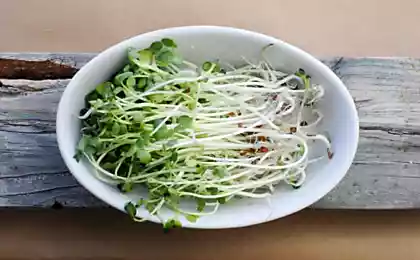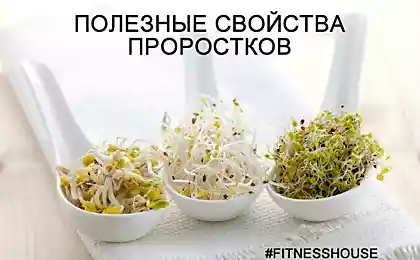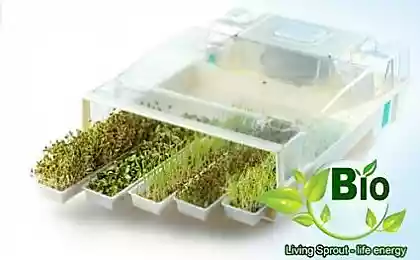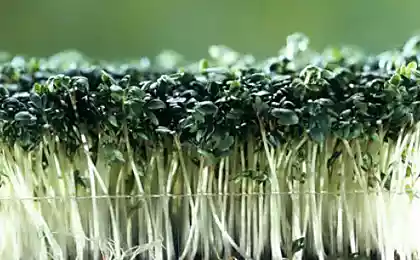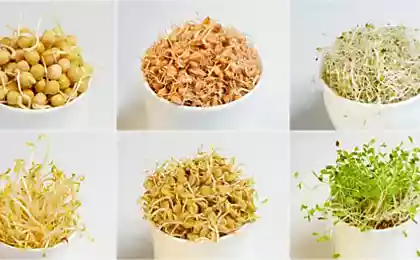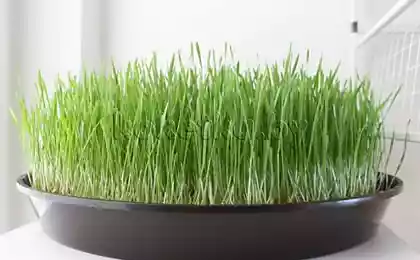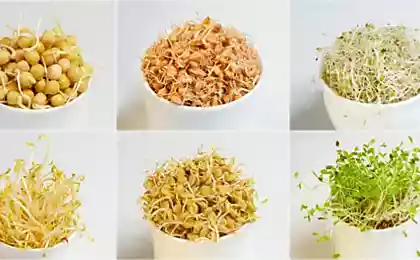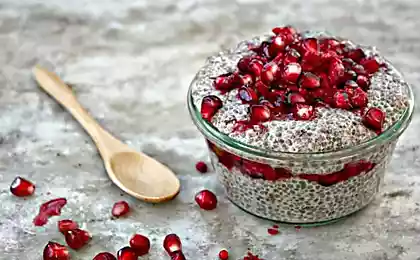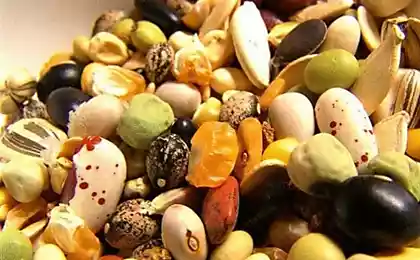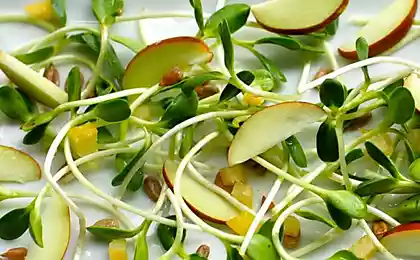765
Sprouts of grains, seeds and cereals
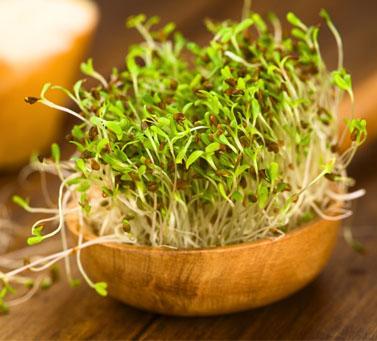
Sprouted grains are rich in natural vitamins and enzymes, and more and more people are starting to add seedlings seeds, cereals and legumes in your diet. The difference between sprouted and whole grains is that:
1. Sprouting grains neutralize phytic acid and other anti-nutrients that prevent minerals completely absorbed.
2. When germination enzymes are activated that are in the seeds and grains, increased vitamin content.
3. Germinated grains contain twice more vitamin B6 than unemerged and four times with niacin lower glycemic index. Sprouts can be eaten raw, and can be dried, milled into flour and used as an additive to baking.
USE seedlings:
Sprouting grains changes their nutritional value and raw they retain all the nutrients and enzymes, from which the work of the intestine depends directly (because the seedlings are encouraging the growth of beneficial bacteria).
Sprouts seeds and cereals are rich in antioxidants and are a poor source of vegetable protein, and the content of vitamins and minerals is not inferior to some superfudam.
Sunflower sprouts, flax, wheat, pea, thistle, sesame, soy, green grechkiFosfor contained in the majority of the seeds is essential for healthy bones and teeth, as well as intelligence and care.
Various sprouts have different advantages and is therefore in the diet can be combined according to your taste sprouts buckwheat, pumpkin, sunflower, sesame, wheat, rye, barley, oats, peas, soybeans, flax, etc. Germinated grains legkousvayaemymi more than whole grains, so they can and should eat raw, whole seedling with leaves and roots.
Legumes sprouts, seeds, grains and nuts complement the wonderful salads, cold soups and sandwiches.
And now in more detail about the most popular porostkah and their use ...
Buckwheat sprouts sunflower Prostki, flax, wheat, peas, thistle, sesame, soybean, green grechkiIz seedlings green buckwheat body receives proteins, carbohydrates, much magnesium, phosphorus, zinc, cobalt, manganese, and calcium, iron, copper, boron, iodine, nickel , vitamins B1, B2, B3, rutin (vitamin antisclerosic). Green buckwheat after germination increases the level of hemoglobin, strengthens the walls of blood vessels, reduces the permeability and fragility of capillaries, prevents retinal hemorrhage. Buckwheat sprouts are shown in coronary heart disease and hypertension, diabetes, anemia and chronic stress, in the treatment of bronchitis and tonsillitis.
Seedlings
PUMPKIN The seedlings are present pumpkin seed quality proteins, fats, magnesium, phosphorus, iron, copper, cobalt, vitamins B1, C, E, carotene. They are particularly rich in zinc (necessary for normal functioning of the brain). Germinated pumpkin seeds are beneficial to the reproductive system, improve the functioning of the urinary tract, provide excellent support for the prostate gland. Especially useful for men after 45 years for the prevention and treatment of prostatitis.
Seedlings
SUNFLOWER Plantlets sunflower, flax, wheat, peas, thistle, sesame, soybean, green buckwheat sunflower seedlings contains high proteins and fats, lecithin, large amounts of magnesium, calcium, iron and iodine, manganese, copper, fluorine, cobalt, vitamins B1, B2, B3, B5, B6, B9, D, E, F, biotin, carotene. Germinated sunflower seeds normalize the acid-alkaline balance of the body, strengthens the nervous system, help maintain good eyesight, improve skin condition.
Seedlings
SESAME Sesame sprouts are rich in high-quality proteins and fats. Germinated sesame seeds contain more calcium than any other food, as well as magnesium, potassium, iron, phosphorus, vitamin B, carotene. They will help to strengthen bones, teeth and nails, help prevent osteoporosis. These seedlings are shown in the fall of fractures and, especially useful for children in the period of change of teeth and intensive growth, as well as women over 45 years old.
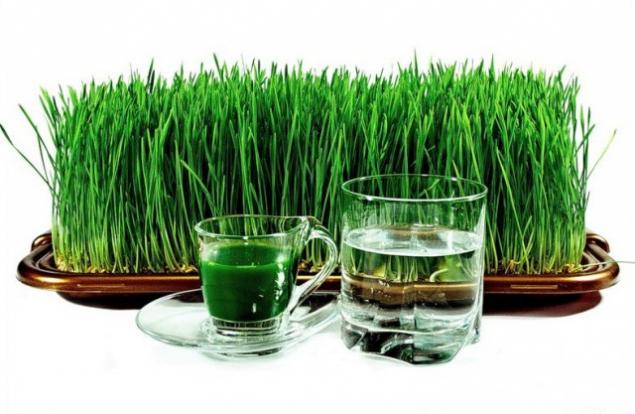
Wheat germ and rye
Plantlets sunflower, flax, wheat, peas, thistle, sesame, soybean, green buckwheat seedlings of wheat and rye contain proteins, carbohydrates, phosphorus, potassium, magnesium, manganese, calcium, zinc, iron, selenium, copper, vanadium, et al., Vitamins B1, B2, B3, B5, B6, B9, E, F, biotin. Grown wheat and rye contribute to the normal functioning of the brain and the heart, stimulate the gastrointestinal tract, facilitates the effects of stress, improve skin and hair condition.
Seedlings
LENTILS Plantlets lentil deliver high quality protein in an organism, a large amount of calcium, phosphorus, magnesium, zinc, iron, selenium, copper and vitamins E, F, B1, B3, B6, B9. According to the content of vitamin C, they are superior to most of the products (in germinating seeds of legumes it increases the amount of 600 times), so are the perfect prophylactic against colds during the autumn-winter period. Sprouted lentils promotes blood formation, accelerates healing processes. Especially useful weak and frequently ill children and adults, as well as for anemia and blood loss, for the prevention of bronchitis and pneumonia, after suffering sore throats and colds.
Seedlings
PEA Prostki sunflower, flax, wheat, pea, thistle, sesame, soy, buckwheat green pea seedlings of high quality proteins and fats, fiber, large amounts of calcium, as well as magnesium, potassium, vitamins A and C. They are low in calories and high nutritional value .
Seedlings
BEAN The bean sprouts large amount of easily digestible protein, carbohydrates, fats, high in potassium, phosphorus, copper and zinc, B vitamins and vitamin C. They possess hypoglycemic, diuretic and antimicrobial action. Recommended for gastritis with low acidity, atherosclerosis and heart rhythm disturbances.
THISTLE seedlings
Sprouts thistle have a special healing power and broad spectrum of activity. They contain vitamins A, D, E, K, F, flavonoids, various minerals, including selenium and zinc. Enhances the formation and excretion of bile, the liver increases the protective properties against infection and poisoning. Shown in acute and chronic diseases of the liver, spleen and inflammation of the bile ducts, gallstones, hemorrhoids, colitis, reduce allergic reactions.
Seedlings SOI
sunflower sprouts, flax, wheat, pea, thistle, sesame, soy, green grechkiProrostki soy "will give" body high-quality proteins and fats, fiber, lecithin, large amounts of calcium, potassium, magnesium, iron, zinc, selenium, and phosphorus, manganese , fluorine, copper, cobalt, vitamin C, B1, B2, B3, carotene. Bean sprouts contain a complete set of amino acids needed by humans. They normalize the metabolism, eliminate the excess cholesterol, help prevent cardiovascular disease and liver function, improve brain function, slow the aging of the pancreas, relieve nervous irritability and fatigue, improve sleep. Germinated soybeans is particularly useful for children, the elderly, pregnant women and nursing mothers, the people intensive mental and physical work.
Flax sprouts
Sunflower sprouts, flax, wheat, pea, thistle, sesame, soy, green buckwheat flax sprouts contain a large amount of oil, carotene, carbohydrates, mucus. This is the most rich source of fatty acids (linoleic and linolenic). This is an excellent emollient and enveloping used in inflammatory and ulcerative processes of the mucous membranes of the gastrointestinal tract. Flax seeds act as a mild laxative, reduce cholesterol.
In no case do not buy grain and seeds, intended for planting: they are treated with pesticides, be sure to pay attention to the quality of seeds and grains for germination, they must be whole, without any black spots. Green, underripe, rotten, over-dried and affected by fungus grain is better to throw out at once.
Ideal conditions for germination: the temperature around 20 degrees Celsius and a dim light, so the window is better to tighten the curtain. Beans, peas, beans rather capricious and often moldy, instead of grow. Inexperienced "gardeners" recommend to start with cereals - wheat, rye and oats
. Germinated seeds can be stored in the refrigerator for several days to keep them fresh longer, be sure to rinse them with cold water.
